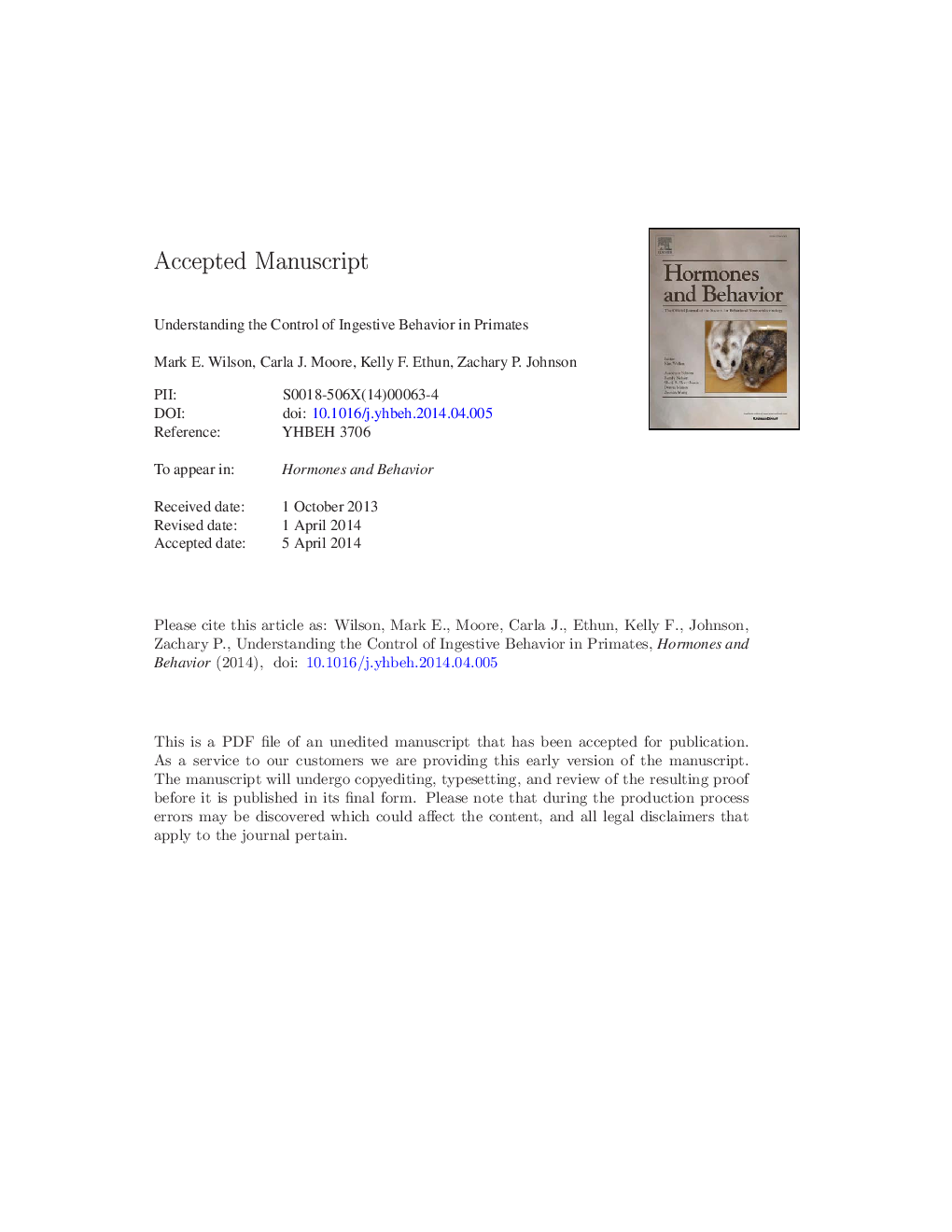| کد مقاله | کد نشریه | سال انتشار | مقاله انگلیسی | نسخه تمام متن |
|---|---|---|---|---|
| 10301470 | 540854 | 2014 | 46 صفحه PDF | دانلود رایگان |
عنوان انگلیسی مقاله ISI
Understanding the control of ingestive behavior in primates
ترجمه فارسی عنوان
درک کنترل رفتار تغذیهای در اولاتها
دانلود مقاله + سفارش ترجمه
دانلود مقاله ISI انگلیسی
رایگان برای ایرانیان
کلمات کلیدی
غیر مقدمه ماکاکس، نوروپپتیدها، اتراستیل، اشتها برنامه نویسی،
ترجمه چکیده
رفتار پرخاشگرانه در جمعیت های آزاد در جمعیت های غیر انسانی تحت تأثیر دسترسی منابع و سازمان گروه اجتماعی قرار می گیرد و بینش ارزشمندی را در مورد تکامل رفتار های سازگار با محیط زیست و سیستم های فیزیولوژیکی ارائه می دهد. همانطور که جمعیت های اسیر ایجاد شد، پرسش هایی در مورد مکانیزم های مجاور که میزان مصرف غذا را در این حیوانات تنظیم می کنند، می توانند به سادگی قابل حل باشند. در دسترس بودن این افراد اسیر به استفاده از گونه های انتخاب شده برای شناخت کنترل اشتها و یا فیزیولوژی متابولیک در انسان منجر شده است. شناخت مشکل کمیت غذا در گروه های آزاد، استفاده از حیوانات اسیر و مجزا، مزیت مشخصی را در اختیار داشتند، در حالی که در همان زمان یک محیط زیست اجتماعی متفاوت از زیستگاه طبیعی حیوانات ایجاد کرد. با این حال، استفاده اخیر از فن آوری های نوین برای کم کردن مقدار مصرف کالری و مصرف انرژی در غذای آزاد، میمون هایی که به صورت اجتماعی نگهداری می شوند، مطالعات آینده ای را انجام می دهد که می توانند با دقت تعریف کنند که چگونه مصرف غذا در واکنش به هر گونه مداخلات در محیط اجتماعی تغییر می کند. این بررسی یک مرور کلی از مطالعات مورد بررسی در مورد مصرف غذا را با استفاده از اسارت افراد غیر انسانی به سه بخش تقسیم می کند: الف) تنظیم عصبی شیمیایی مصرف غذا در افراد غیر انسانی؛ ب) آیا قرار گرفتن در معرض رژیم های خاص در طول دوره های رشد کلیدی، تفاوت های در تنظیمات رژیم غذایی را تغییر می دهد یا تغییرات نوروپپتیدهای مربوط به تغذیه را تغییر می دهد؛ و ج (چگونه عوامل روان شناختی بر تنظیم اشتها تأثیر می گذارند. از آنجایی که الگوهای تغذیه بیش از سیگنال های سرسخت و غیر عقلانی رانده می شوند، قدردانی می کنند که چگونه زمینه اجتماعی بر الگوهای تغذیه در پرایندهای غیر انسانی تأثیر می گذارد، ممکن است برای درک پیچیدگی های بیولوژیکی تغذیه در انسان بسیار مفید باشد.
موضوعات مرتبط
علوم زیستی و بیوفناوری
بیوشیمی، ژنتیک و زیست شناسی مولکولی
علوم غدد
چکیده انگلیسی
Ingestive behavior in free-ranging populations of nonhuman primates is influenced by resource availability and social group organization and provides valuable insight on the evolution of ecologically adaptive behaviors and physiological systems. As captive populations were established, questions regarding proximate mechanisms that regulate food intake in these animals could be more easily addressed. The availability of these captive populations has led to the use of selected species to understand appetite control or metabolic physiology in humans. Recognizing the difficulty of quantitating food intake in free-ranging groups, the use of captive, singly-housed animals provided a distinct advantage though, at the same time, produced a different social ecology from the animals' natural habitat. However, the recent application of novel technologies to quantitate caloric intake and energy expenditure in free-feeding, socially housed monkeys permits prospective studies that can accurately define how food intake changes in response to any number of interventions in the context of a social environment. This review provides an overview of studies examining food intake using captive nonhuman primates organized into three areas: a) neurochemical regulation of food intake in nonhuman primates; b) whether exposure to specific diets during key developmental periods programs differences in diet preferences or changes the expression of feeding related neuropeptides; and c) how psychosocial factors influence appetite regulation. Because feeding patterns are driven by more than just satiety and orexigenic signals, appreciating how the social context influences pattern of feeding in nonhuman primates may be quite informative for understanding the biological complexity of feeding in humans.
ناشر
Database: Elsevier - ScienceDirect (ساینس دایرکت)
Journal: Hormones and Behavior - Volume 66, Issue 1, June 2014, Pages 86-94
Journal: Hormones and Behavior - Volume 66, Issue 1, June 2014, Pages 86-94
نویسندگان
Mark E. Wilson, Carla J. Moore, Kelly F. Ethun, Zachary P. Johnson,
